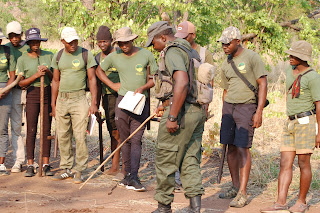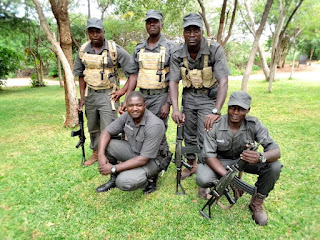Picket Chabwedzeka, Zimbabwean ecologist
In Europe and in the United States, when you hear about conservation, you often think about international nonprofits such as the World Wildlife Fund, and of the discussion about zoos in "developed" countries: should animals be kept in captivity for our children and for us to gaze at behind a fence? Is the money they raise for conservation worth the sacrifice of these animals' lifestyle?
On the ground, there are many more people involved in conservation. Southern Africa has a large portion of the world's giraffes, lions, rhinoceros, hippopotamus, elephants, as well as a plethora of various antelopes and birds.
 |
| Mitchel and Picket at Sinamatella Camp, Hwange, Zimbabwe, 2021 |
He was born and raised in Harare. Growing up, he had no prior knowledge of careers in wildlife preservation, until after finishing his high school degree, he volunteered at the Zambezi National Park.
From there he traveled to Cape Town, in South Africa, to work with his grandmother, who is a trader, dealing in a variety of merchandise. He started studying at University of Cape Town (UCT), majoring in Geography and Environmental Management, but when fees were raised, he took an evening position as a waiter to put funds aside for one semester, and then transferred to the University of South Africa. During this time, he started a position as a field guide at the Mountainview-Moholoholo private game reserve, working his way up to an Assistant Reserve Manager during the five years he was there. In 2013, after his final exam, he moved to Somkhanda in Kwazulu Natal, a special community-owned reserve, as an Internship Program Manager.
 |
| Zululand community outreach and homestay event (Picket is at the right) |
He met his wife Mitchel (pronounced "Michelle") a few years ago, and they held a traditional marriage ceremony last year.
 |
| Black rhinos with Picket |
What is his biggest passion? As an ecologist, he's very involved in the feeding behavior, breeding and safety of black rhinoceros in all the areas he worked in, starting in South Africa's Moholoholo. He recently completed a "black rhinoceros preferred browse" study, yet to be published. He currently manages a black rhinoceros breeding project in Victoria Falls and has had so far 5 rhinoceros calves born under his watch since 2015.
 |
| Ranger training |
 |
| Picket and his ranger team |




Comments
Post a Comment
Please let me know your thoughts and questions. Also, if you feel that anything is incorrect, please let me know.
I need to moderate the comments, as in recent years there has been a spike in spam.